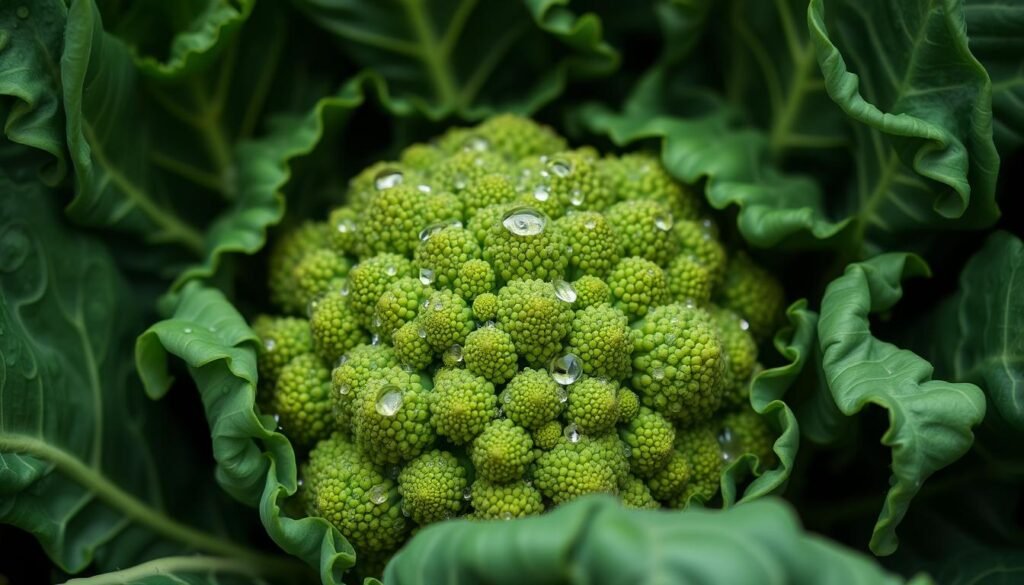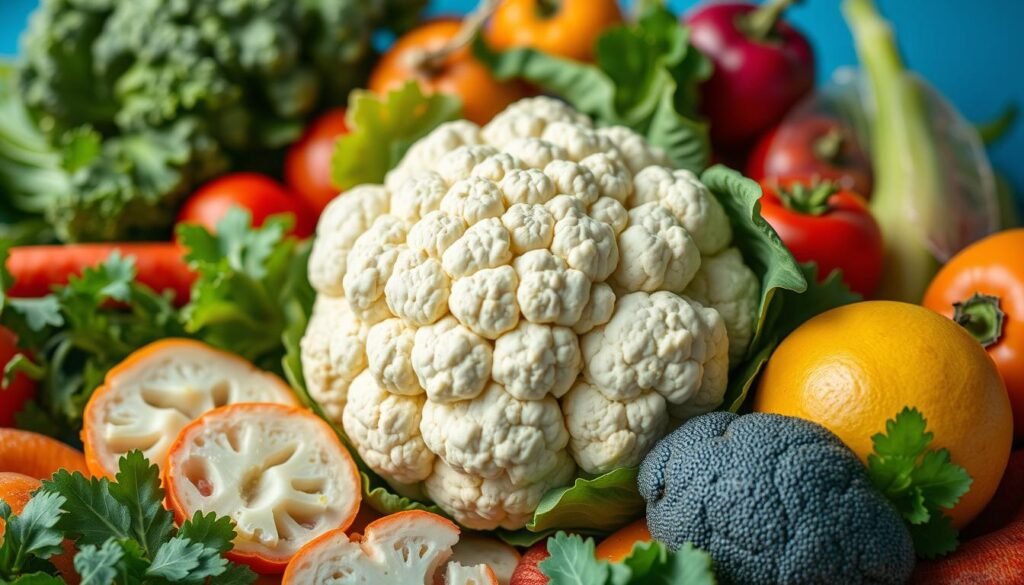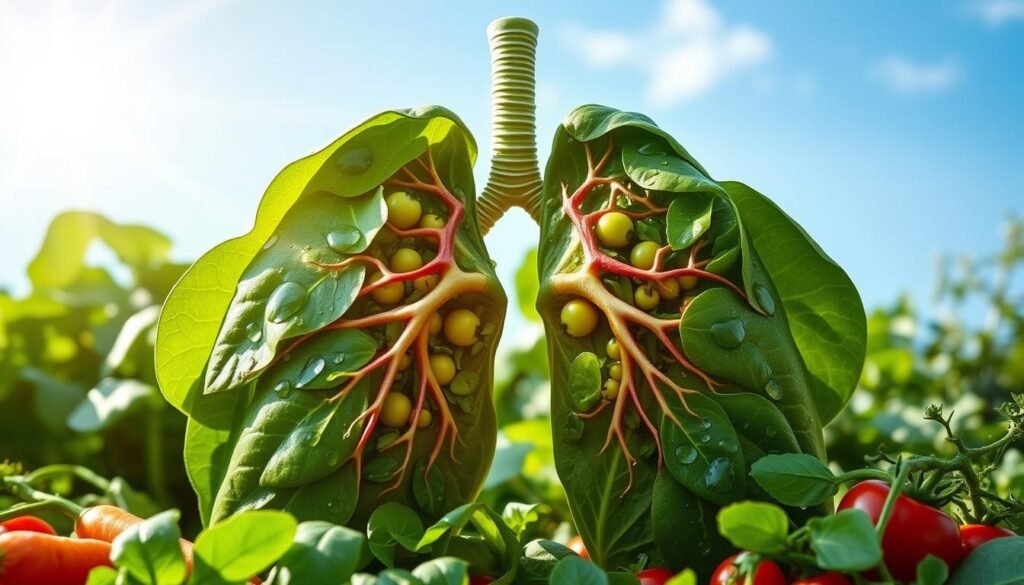Lung cancer leads in cancer deaths, with over 135,000 lives lost each year in the U.S. This fact highlights the importance of lung health. Eating the right veggies is key to improving our lungs. A vegetable-rich diet strengthens our breathing system and helps prevent diseases like lung cancer. Good nutrition also improves lung function and lowers the risk of respiratory problems.
In this article, we’ll explore the best vegetables for lung health. Each vegetable has special benefits that boost our breathing. You will also learn how a varied diet improves lung health. For more about important nutrients for lung health, visit this comprehensive resource.
Key Takeaways
- Lung cancer results in over 135,000 deaths annually in the U.S.
- A vegetable-rich diet can enhance lung health and functionality.
- Specific vegetables possess nutrients that combat lung cancer risk.
- Consuming antioxidants helps protect respiratory organs.
- Hydration and lifestyle choices play a supporting role in lung health.
- Consult healthcare providers for personalized dietary advice.
The Importance of Lung Health
Lung health is key to overall wellness. Healthy lungs pump oxygen all through the body. This is crucial for our body to work well. Lung health affects how long you live and your life’s quality.
What we breathe in impacts our lung health. Clean air can keep our lungs healthy. But, in big cities, air often has pollutants. Bad air quality can lead to lung diseases, hurting many around the globe.
Eating foods that are good for you helps your lungs too. Foods like kale, broccoli, and spinach are packed with good stuff. These can defend your lungs from harm caused by pollution and bad habits.
Know the signs of lung issues. These include a lasting cough, feeling short of breath, and getting tired easily. Being aware and acting fast can make lung problems better. This improves how well your lungs work.
| Factor | Impact on Lung Health |
|---|---|
| Air Quality | Directly affects breathing and susceptibility to diseases |
| Diet | Nutrients and antioxidants can support lung function |
| Exercise | Improves oxygen circulation and overall lung capacity |
| Smoking | Major cause of respiratory diseases and lung cancer |
Benefits of a Vegetable-Rich Diet
Eating lots of vegetables is key for better health over time. Adding different veggies to your meals gives great nutritional perks. Veggies have important vitamins, minerals, and fiber.
These nutrients help keep our bodies working well and feeling good. Many vegetables also have antioxidants. These help fight off oxidative stress, which is important for lung health.
Studies show people eating more veggies have fewer chronic diseases. This includes fewer lung problems. Veggies have vitamin C, beta-carotene, and flavonoids. These nutrients boost health and the immune system.
Eating vegetables regularly is good for your stomach. It also lowers inflammation in the body.
To show how certain veggies help, here’s a table with their nutritional content:
| Vegetable | Vitamin C (mg) | Fiber (g) | Antioxidants (ORAC Value) |
|---|---|---|---|
| Broccoli | 89.2 | 2.6 | 1,510 |
| Kale | 120 | 3.6 | 1,770 |
| Spinach | 28.1 | 2.2 | 1,800 |
| Carrots | 7.6 | 2.8 | 1,785 |
Adding these veggies to your meals boosts nutrition. This supports lung health and makes you feel more alive.
Top Vegetables for Lung Cancer
Choosing the right vegetables is key for lung health and may reduce cancer risk. Add a mix of top vegetables for lung cancer, like cruciferous veggies and antioxidant-rich plants. These foods are essential for cell repair and protection.
Cruciferous Vegetables and Their Impact
Broccoli, kale, and cauliflower are great for fighting lung cancer. They have sulforaphane, stopping cancer cell growth and boosting detox. Eating these as part of your diet is good for your lungs.
Antioxidant-Rich Foods for Lung Protection
Antioxidant-rich foods keep lung tissues safe and lessen swelling. Tomatoes, spinach, and carrots are good for lung health. They are linked to better lung wellness. For tips on these foods, check the Moffitt Cancer Center.
Broccoli: A Superfood for Lungs
Broccoli is a standout superfood that offers tons of nutrition for your health. Its nutrients are especially good for your lungs. It has vitamins C, K, and A, fiber, and phytochemicals. These make broccoli a top choice for a healthy diet.
Nutritional Profile of Broccoli
The nutritional profile of broccoli features:
- Vitamin C: It boosts the immune system and fights off harmful substances.
- Vitamin K: It’s important for strong bones and helps reduce swelling.
- Beta-Carotene: It turns into vitamin A, good for the lungs and immunity.
- Fiber: It keeps the digestive system healthy and supports good gut bacteria.
- Phytochemicals: These help fight damage to cells, important for lung health.
How Broccoli Supports Lung Health
Studies show eating broccoli can boost lung health. Its antioxidants help lessen inflammation, key for those with lung issues. Plus, sulforaphane in it protects the lungs from harm by toxins.

Kale: A Leafy Green Powerhouse
Kale is one of the top nutrient-dense foods you can find. It’s packed with vital vitamins like A, C, and K. These play a big role in keeping you healthy. That’s why kale is a top choice among leafy greens for lungs.
Kale is full of antioxidants. These include carotenoids and flavonoids that help protect your lungs from damage. Research shows they can improve how your lungs work and might lower cancer risks. You can enjoy kale in many ways, like in salads or smoothies.
If you want to know more, check out the full range of kale offers. It’s good for your bones, helps reduce blood pressure, and keeps your heart healthy. Adding kale to your meals boosts your nutrition and supports your lungs.
| Nutrient | Amount per 100g | Daily Value (%) |
|---|---|---|
| Calories | 35 | 2% |
| Protein | 2.9g | 6% |
| Fat | 1.5g | 2% |
| Carbohydrates | 4.4g | 1% |
| Vitamin A | 9990 IU | 200% |
| Vitamin C | 120mg | 200% |
| Vitamin K | 540mcg | 450% |
Cauliflower and Its Protective Properties
Cauliflower is a powerhouse of nutrients, making it great for your health. It’s packed with compounds that are good for your lungs. This veggie is more than just a side dish; it’s a key player in a healthy diet.
Phytochemicals in Cauliflower
Cauliflower is full of health-boosting phytochemicals like indoles and glucosinolates. These help your body detox, which is good for your lungs. Studies show eating cauliflower regularly might lower the risk of lung problems by protecting the lung tissue.
Some remarkable cauliflower health benefits include:
- Getting rid of bad substances from your body
- Boosting your immune system, which keeps your lungs healthy
- Being a rich source of antioxidants that fight off stress from oxidation
Adding cauliflower to your diet is a tasty way to boost your health. You can roast it, steam it, or make it into soups. It’s a delicious approach to improving your overall health.

The Role of Tomatoes in Lung Health
Tomatoes are a key part of many diets, loved for their taste and health boosts. They are packed with essential nutrients, aiding in lung health. Eating tomatoes regularly may help your lungs, thanks to their antioxidants.
Vitamins and Nutrients Found in Tomatoes
In tomatoes, lycopene is a standout nutrient, known for fighting free radicals. These radicals can harm lung tissues. Tomatoes also have plenty of vitamin C. This vitamin boosts the immune system and lessens inflammation in the lungs.
Let’s take a closer look at the important nutrients in tomatoes that help our lungs:
| Nutrient | Amount per 100g | Health Benefits |
|---|---|---|
| Lycopene | 2573 µg | Protects lung tissue from damage |
| Vitamin C | 13.7 mg | Boosts immune function and reduces inflammation |
| Vitamin A | 833 IU | Supports respiratory health |
| Folate | 15 µg | Aids in repairing DNA within lung cells |
The health benefits of tomatoes are not only for the lungs. Eating them often can lower the risk of chronic respiratory problems. This makes tomatoes a smart choice for anyone looking to stay healthy.
Spinach: A Nutrient-Dense Veggie
Spinach is a super healthy vegetable loaded with nutrients. It is low in calories yet rich in essential vitamins and minerals. These nutrients support our overall health. Eating spinach often helps lung health and improves overall well-being. It’s perfect for a balanced diet.

The Anti-Inflammatory Benefits of Spinach
Spinach is known for its strong anti-inflammatory effects. It’s rich in antioxidants like quercetin and kaempferol. These antioxidants help lower inflammation, which can boost lung function. Adding spinach to your meals can help with respiratory issues and improve lung health.
Looking to eat healthier? Try adding spinach to your diet. It’s nutrient-packed and fits well in many dishes, from salads to smoothies.
| Nutrient | Amount per 100g of Spinach |
|---|---|
| Vitamin K | 483 µg |
| Vitamin A | 2813 IU |
| Folate | 194 µg |
| Vitamin C | 28.1 mg |
| Iron | 2.7 mg |
Spinach is an excellent choice for a health-focused diet, due to its rich nutrition.
Other Vegetables to Consider for Lung Health
Don’t forget about carrots, beets, and peppers when thinking of lung health. These veggies are full of nutrients that help lungs work better and keep you healthy. Eating them regularly can really help keep your lungs in good shape.
Fruits vs. Vegetables: What Works Best?
People often wonder if fruits or vegetables are better for lung health. Both are important for keeping lungs healthy. Fruits offer vitamins and antioxidants, while vegetables have fibers and phytochemicals. A mix of both fruits and vegetables is best for your lungs.
Integrating More Vegetables into Your Diet
Adding vegetables to your diet is easy and beneficial. Here are some tips:
- Start your day with a vegetable smoothie, adding spinach or kale.
- Include a variety of colorful vegetables in salads or as snacks.
- Add vegetables like bell peppers and carrots to stir-fries for added crunch and nutrients.
- Replace traditional pasta with spiralized veggies, such as zucchini.
Planning your meals can also help you eat more veggies. Try preparing your meals ahead of time. This way, you always have healthy vegetable options. It saves you time and helps you eat better.
| Vegetable | Health Benefits |
|---|---|
| Carrots | Rich in beta-carotene and antioxidants that protect lung tissue. |
| Beets | Help improve oxygen transport in the blood and reduce inflammation. |
| Peppers | High in vitamin C, they support overall immune health. |
Conclusion
Eating lots of vegetables can really help your lungs and cut down on lung cancer risk. The benefits of vegetables, especially cruciferous ones, show how diet and genes can work together. This means eating veggies like broccoli, kale, and cauliflower could help people with certain genes have a lower risk of lung cancer. Adding these vegetables to your meals can improve your breathing and overall health.
These veggies are full of nutrients that fight inflammation and help your lungs work better. Choosing the right foods means you’re taking steps to keep your lungs healthy. A diet rich in vegetables doesn’t just give immediate benefits. It also helps you live a healthier life in the long run.
Making sure to eat different kinds of vegetables is key to better lung health. It’s important to understand the big role they play in keeping our lungs strong. By making vegetables a main part of our meals, we can all look forward to a healthier future. This shows how crucial it is to include them in our diet.